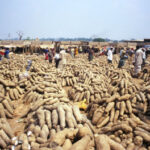Dr Simeon Ehui, Director General and CGIAR Regional Director for Continental Africa, International Institute of Tropical Agriculture, IITA has revealed the importance of having reliable production of high-quality forage for livestock systems. He was speaking at launching of International Livestock Research Institute and Forage Genetic Resource Centre at the IITA headquarters in Ibadan, capital of Oyo State. The centre is an extension of a global forage genebank, and it marks a significant milestone in a journey toward enhancing the productivity and profitability of smallholder and other livestock systems in Nigeria.
According to the release culled from IITA’s website the International Livestock Research Institute unveiled a Forage Genetic Resource centre to boost Nigeria’s livestock industry. The centre is expected to house over 80 cultivars and the accession of tropically adapted and improved forage for livestock in Nigeria and West Africa.
He said, “To have over 100 forage genetic materials in Nigeria for research, conservation, promotion, and distribution to farmers and stakeholders, the FGR initiative will support the development of pasture and livestock production in Nigeria and bolster the Federal Government’s efforts to curb the herders-farmers crisis and promote food and nutrition security,”
Tunde Amole, ILRI-Nigeria Country Representative, said ILRI’s impact over the past five decades has contributed to improving food and nutrition security and reducing poverty in developing countries through research that ensures sustainable livestock systems.
Amole said that it would establish genetic resources plots to produce forage seeds for farmers and researchers.
Adebowale Akande Chief Executive Officer, IITA Business Incubation Platform (IITA-BIP), in his goodwill shared insights on leveraging diverse partnerships for research scaling and acceleration by creating an enabling environment and structures that encourage collaborations.
During the launch, stakeholders explored strategies for strengthening the livestock sector and addressing the needs of a growing population in Nigeria and West Africa. Participants emphasised the importance of research institutes partnering with universities to train young people in maximising innovation in the sector.
The National Agricultural Extension and Research Liaison Services (NAERLS) South-West Coordinator, Adewunmi Adesina, suggested that ILRI leverage NAERLS’ extension activities.
He noted that these activities would facilitate knowledge transfer to smallholder farmers in Nigeria, thereby supporting their efforts to improve livestock production and sustainability.
The official launch of the FGR plot took place by planting various pasture varieties on the newly established resources plot. This hands-on activity showcased ILRI’s commitment to promoting sustainable pasture production and highlighted the practical applications of research efforts.
The demonstration illustrated how the FGR plot will be a pivotal resource for advancing livestock feed solutions in Nigeria and West Africa.
Lauding the FGR plot initiative, Ehui said that while genetic, management, and health interventions are essential for improving livestock productivity, these efforts are unsustainable without proper feeding.
“Currently, the demand for higher-yielding seeds outstrips supply, highlighting a critical area that requires our attention and action. This initiative will ensure reliable production of high-quality forage, which is contingent upon good quality forage seed availability,” he added.












